In the world of web development, choosing the right technology stack can make all the difference in creating a successful and efficient application. Two popular options that have been gaining significant attention are the MERN stack and the MEAN stack. Both stacks offer a full JavaScript development environment, but they differ in terms of the technologies used. In this article, we will break down the pros and cons of each stack, helping you make an informed decision for your next project. Whether you’re an experienced developer or just starting out, understanding the strengths and weaknesses of these stacks can save you time, and effort. So, let’s dive into MERN Stack vs MEAN Stack and discover which one best suits your needs.
Understanding The Components Of MERN Stack
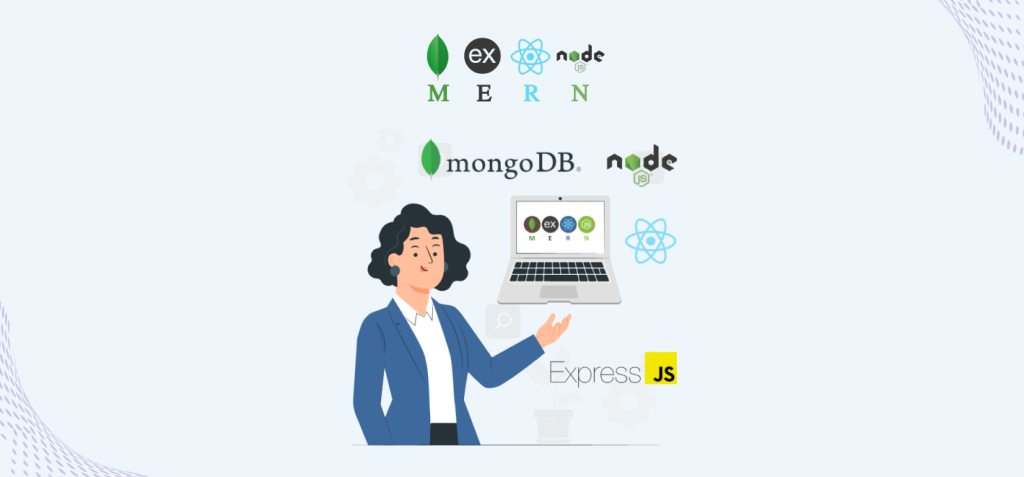
The MERN stack is a full-stack JavaScript framework that comprises four key components: MongoDB, Express, React, and Node.js. Each component plays a crucial role in the development process, allowing developers to build dynamic and interactive web applications.
MongoDB is a NoSQL database that stores data in JSON-like documents. Its flexibility and scalability make it an ideal choice for handling large amounts of data. MongoDB’s document-based model allows for easy integration with other components of the MERN stack.
Express.js is a lightweight web application framework for Node.js. It provides a set of features and tools that simplify the development of web applications. Express is known for its simplicity and minimalistic design, making it a preferred choice for developers who value speed and efficiency.
React.js is a JavaScript library for building user interfaces. It enables developers to create reusable UI components and efficiently update the user interface as the application’s state changes. React’s virtual DOM and component-based architecture contribute to its high performance and reusability.
Node.js is a JavaScript runtime built on Chrome’s V8 JavaScript engine. It allows developers to run JavaScript code on the server side, enabling server-side rendering and efficient handling of I/O operations. Node.js’s non-blocking, event-driven architecture makes it ideal for building scalable and high-performance web applications.
Understanding The Components Of MEAN Stack
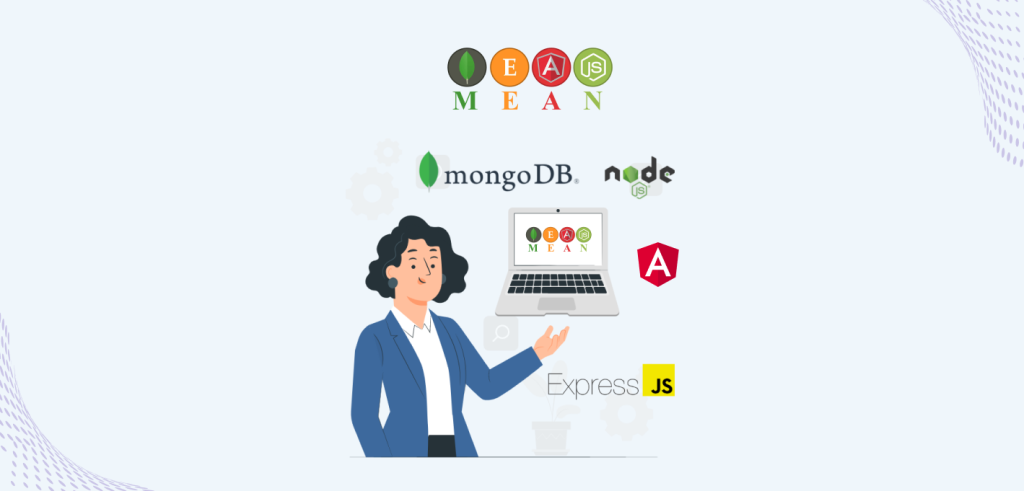
Similar to the MERN stack, the MEAN stack is also a full-stack JavaScript framework with four core components: MongoDB, Express, Angular, and Node.js. While it shares some similarities with the MERN stack, there are notable differences in terms of the front-end framework.
MongoDB and Express in the MEAN stack function similarly to their counterparts in the MERN stack. MongoDB provides a flexible data storage solution, while Express offers a minimalist and efficient web application framework.
Angular is a TypeScript-based framework developed by Google for building dynamic and scalable web applications. It follows the MVC (Model-View-Controller) architecture and offers a wide range of features, such as two-way data binding, dependency injection, and component-based development.
Node.js in the MEAN stack serves the same purpose as in the MERN stack, allowing for server-side JavaScript execution and efficient handling of I/O operations.
Pros Of Using MERN Stack

01. Full-stack JavaScript
One of the biggest advantages of the MERN stack is that it allows developers to use JavaScript for both client-side and server-side development. This means that developers can use a single programming language throughout the entire development process, making it easier to maintain and update the codebase.
02. Scalability
MongoDB, the database component of the MERN stack, offers horizontal scalability, which means that it can handle large amounts of data and traffic without sacrificing performance. This makes the MERN stack a good choice for applications that are expected to grow and scale over time.
03. Large and Active Community
The MERN stack has a large and active community of developers, which means that there are plenty of resources, tutorials, and libraries available to support the development process. This can be particularly helpful for developers who are just starting out or who need assistance with specific aspects of their projects.
Cons Of MERN Stack
01. Learning Curve
While JavaScript is a popular programming language, not all developers are familiar with the MERN stack and its components. This means that there may be a learning curve involved in getting up to speed with the stack and its best practices. However, once developers become familiar with the stack, they can benefit from its efficiency and productivity.
02. Performance
While the MERN stack offers scalability, it may not be the best choice for applications that require high-performance or real-time data processing. MongoDB, the database component of the stack, is known for its flexibility and scalability but may not perform as well as traditional SQL databases in certain scenarios.
03. Complexity
The MERN stack consists of several components, each with its own set of tools and libraries. This can make the stack more complex to work with, especially for developers who are new to web development or who prefer a more streamlined development process.
Pros Of Using MEAN Stack

01. Simplicity
The MEAN stack consists of four main components: MongoDB, Express.js, Angular, and Node.js. With a similar structure to the MERN stack, MEAN offers a simplified development process as developers can use JavaScript for both client-side and server-side development.
02. Performance
MEAN stack applications are known for their high performance and real-time data processing capabilities. MongoDB, the database component of the stack, can handle large amounts of data and traffic without sacrificing performance, making it a good choice for applications that require real-time updates and fast response times.
03. Code Reusability
Angular, the front-end framework in the MEAN stack, allows developers to create reusable UI components, making it easier to develop and maintain complex web applications. This can save developers time and effort in the long run, as they can reuse existing components instead of building everything from scratch.
Cons Of MEAN Stack
01. Learning Curve
Similar to the MERN stack, the MEAN stack may have a learning curve for developers who are not familiar with its components. While JavaScript is a popular programming language, it may take some time for developers to become proficient with Angular, the front-end framework in the MEAN stack.
02. Limited Community Support
Compared to the MERN stack, the MEAN stack has a smaller community of developers. This means that there may be fewer resources, tutorials, and libraries available to support the development process. However, the community is still active and growing, and developers can find support through forums and online communities.
03. Less Flexibility
While the MEAN stack offers high performance and real-time data processing capabilities, it may not be as flexible as the MERN stack in terms of database options. MongoDB is the default choice for the MEAN stack, and while it offers scalability and performance, it may not be the best fit for every project.
Use Cases For MERN Stack
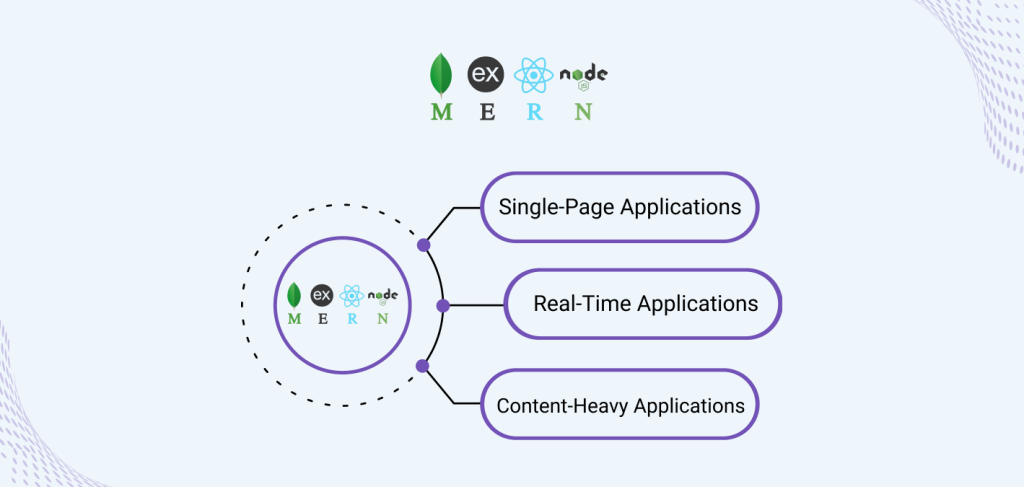
The MERN stack is well-suited for various types of web development projects, including:
- Single-Page Applications
MERN’s reliance on React allows for the efficient creation of single-page applications that provide a seamless user experience.
- Real-time Applications
The MERN stack’s use of Node.js and React makes it suitable for real-time applications that require instant updates, such as chat applications or collaborative tools.
- Content-Heavy Applications
MongoDB’s flexible document-based model allows for easy storage and retrieval of large amounts of structured or unstructured data, making it ideal for content-heavy applications.
Use Cases For MEAN Stack
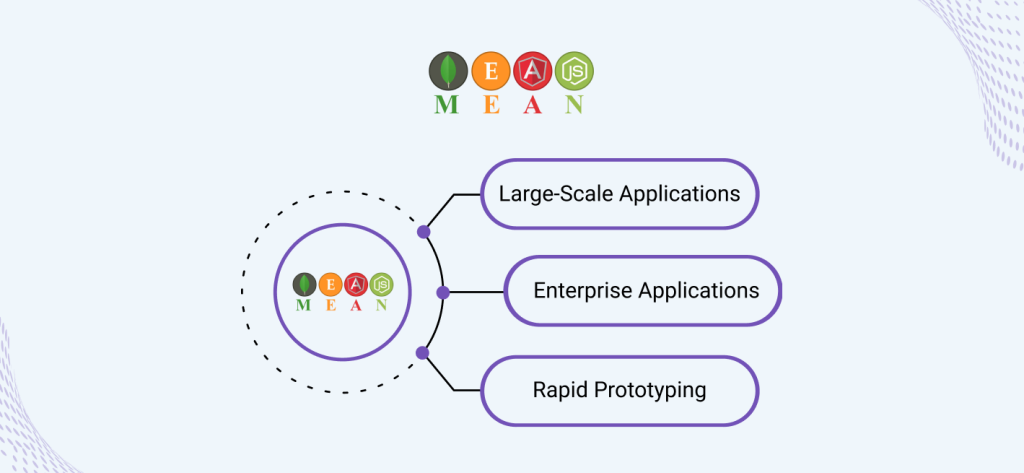
The MEAN stack is a good choice for the following types of web development projects:
- Large-Scale Applications
Angular’s robust features, such as dependency injection and two-way data binding, make it ideal for building complex and large-scale applications. - Enterprise Applications
MEAN’s full-stack capabilities and Angular’s strong community support make it suitable for enterprise-level applications that require scalable and maintainable solutions. - Rapid Prototyping
MEAN’s unified JavaScript stack allows for quick prototyping and development cycles, making it suitable for projects with tight deadlines or proof-of-concept requirements.
Choosing Between MERN Stack vs MEAN Stack – Factors To Consider
When choosing between the MERN stack and the MEAN stack, there are several factors to consider:
01. Project requirements
Evaluate the specific requirements of your project, such as performance, scalability, and real-time data processing. Consider whether the MERN stack or the MEAN stack aligns better with these requirements.
02. Team Expertise
Assess the skill set of your development team. If your team is more comfortable with JavaScript and has experience with front-end frameworks like React or Angular, it may be easier for them to work with the respective stack.
03. Community Support
Consider the availability of resources, tutorials, and libraries for each stack. A larger community can provide more support and make it easier to troubleshoot issues or find solutions to common problems.
04. Long-Term Goals
Consider your long-term goals for the application. If scalability and flexibility are important, the MERN stack may be a better choice. If performance and real-time data processing are the primary concerns, the MEAN stack may be more suitable.
Real-World Examples Of Companies Using The MERN Stack
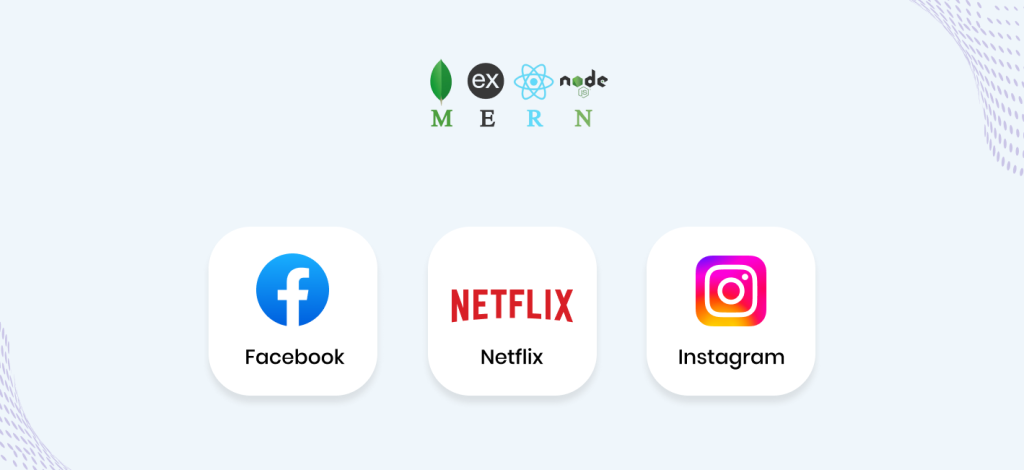
Several companies have successfully used the MERN stack for their projects. Here are a few examples:
01. Facebook
Facebook uses the MERN stack for its Ads Manager tool, which allows advertisers to create and manage their ad campaigns. The MERN stack provides the scalability and flexibility needed to handle the large amount of data generated by the platform.
02. Netflix
Netflix uses the MERN stack for its content recommendation system. The stack allows Netflix to process and analyze large amounts of user data in real time, providing personalized recommendations to its users.
03. Instagram
Instagram uses the MERN stack for its web application. The stack allows Instagram to handle the high traffic and data processing requirements of its platform.
Real-World Examples Of Companies Using MEAN Stack
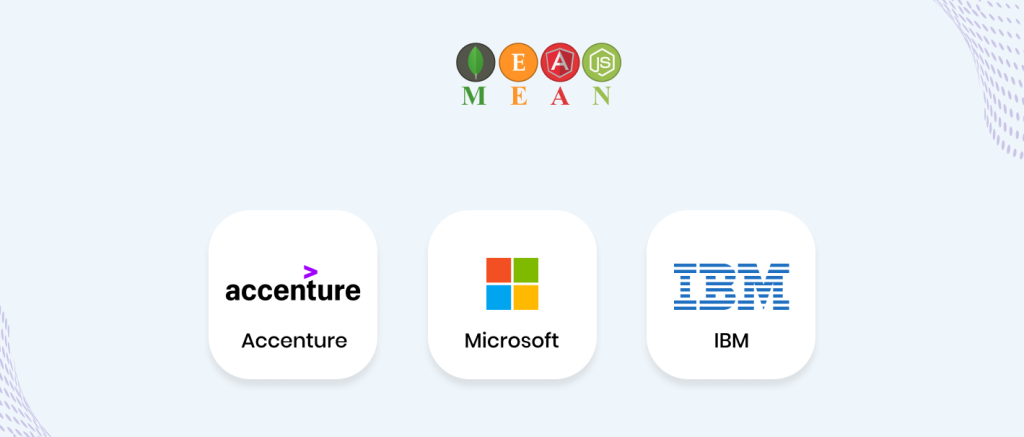
The MEAN stack has also been adopted by several companies for their projects. Here are a few examples:
01. IBM
IBM has used the MEAN stack for its Watson IoT platform, which allows developers to build and deploy IoT applications. The MEAN stack provides the performance and real-time data processing capabilities needed for the platform.
02. Microsoft
Microsoft has used the MEAN stack for its Azure IoT Suite, which helps businesses connect, monitor, and manage their IoT devices. The MEAN stack allows Microsoft to handle the large amounts of data generated by IoT devices and process it in real time.
03. Accenture
Accenture has used the MEAN stack for its cloud-based collaboration platform, which allows teams to work together and share information. The MEAN stack provides the flexibility and performance needed for the platform.
MERN Stack vs MEAN Stack: A Detailed Comparison
Now, let’s dive deeper into a detailed comparison of the MERN Stack vs MEAN Stack across various aspects:
| Frontend Development | React in the MERN stack offers a component-based approach and a virtual DOM, while Angular in the MEAN stack provides a comprehensive framework with two-way data binding and dependency injection. |
| Backend Development | Both stacks leverage Node.js for server-side JavaScript execution, allowing for efficient handling of I/O operations. Express is the go-to framework for both stacks, providing a minimalist and efficient web application framework. |
| Database | MongoDB serves as the database for both stacks, offering flexibility and scalability. MongoDB’s document-based model allows for easy integration with other components in the stack. |
| Community Support | React and Angular both have active communities, but Angular’s community is generally considered larger and more mature. This results in a wider range of resources, plugins, and community support for the MEAN stack. |
| Learning Curve | React in the MERN stack is generally considered easier to learn compared to Angular in the MEAN stack. React’s simplicity and JavaScript familiarity make it a popular choice for developers new to JavaScript frameworks. |
| Performance | Both stacks can deliver high-performance applications, but React’s virtual DOM and Node.js’s non-blocking I/O give the MERN stack an edge in terms of raw performance and scalability. |
Resources For Learning MERN Stack and MEAN Stack
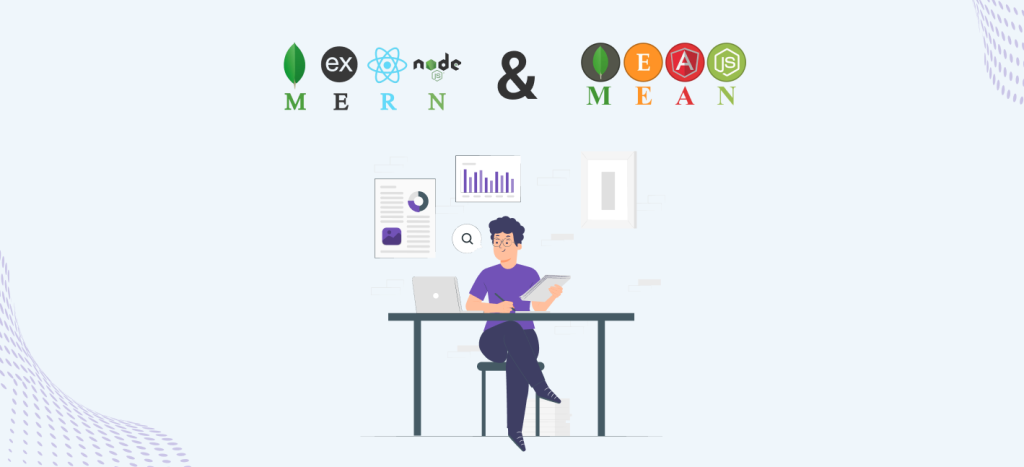
If you’re interested in learning more about the MERN stack and the MEAN stack, here are some resources to get you started:
01. MERN Stack:
- Official MongoDB documentation
- Official Express.js documentation
- Official React documentation
- Official Node.js documentation
02. MEAN Stack
- Official MongoDB documentation
- Official Express.js documentation
- Official Angular documentation
- Official Node.js documentation
These resources provide comprehensive documentation, tutorials, and examples to help you get started with the MERN stack and the MEAN stack.
Final Thoughts On MERN Stack vs MEAN Stack
In conclusion, both the MERN stack and the MEAN stack offer a full JavaScript development environment and have their own strengths and weaknesses. The MERN stack is known for its scalability, flexibility, and extensive community support. On the other hand, the MEAN stack offers simplicity, high performance, and real-time data processing capabilities. When choosing between the two, consider your project requirements, team expertise, community support, and long-term goals. By understanding the components and evaluating these factors, you can make an informed decision and select the stack that best suits your needs.
Choose Aipxperts For Your MERN Stack & MEAN Stack Development Needs!
Choose Aipxperts for your MERN Stack and MEAN Stack development needs! Our team of skilled developers ensures the creation of powerful and efficient web applications. Whether it’s building dynamic websites or scalable web solutions, our expertise in MERN and MEAN Stack guarantees a seamless development process and outstanding results for your projects. Collaborate with Aipxperts to bring your ideas to life and take your web development to the next level.
MERN Stack Vs MEAN Stack | Choose top-notch MERN Stack & MEAN Stack development services with Aipxperts. Contact us for project estimates and enjoy a 15-day risk-free trial period.







